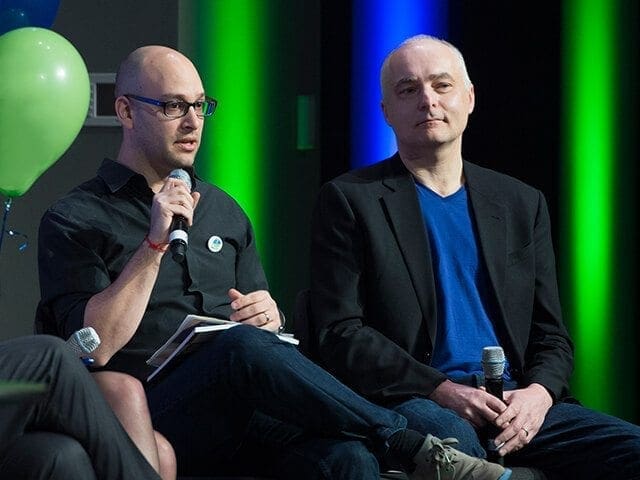Why LEO Pharma picked Toronto for its new innovation lab

Zayna Khayat, senior advisor of health system innovation at MaRS and director of MaRS EXCITE, recently caught up with Miron Derchansky, head of LEO Innovation Lab in Toronto, regarding the pharma company’s recent move to the Greater Toronto Area.
Q&A with Miron Derchansky of LEO Innovation Lab
Zayna: Tell us more about LEO Pharma.
Miron: LEO Pharma is a leading global pharmaceutical company specializing in dermatology and thrombosis. It has been developing pharmaceutical products since 1908. Headquartered in Denmark, LEO is the oldest Danish healthcare company, with employees in 61 countries and products being sold in more than 100 countries.
Zayna: Is it true that LEO Pharma is not a publicly traded company?
Miron: LEO Pharma is owned in full by the LEO Foundation and is totally independent of outside capital. The LEO Foundation is an independent private institution whose aim is to ensure the continuance of the LEO Pharma group of companies. The foundation provides the stability needed to plan focused, long-term research and development programs for drugs and therapies, addressing unmet patient needs.
Being owned by a foundation allows LEO Pharma to make decisions quickly and to move on great ideas and initiatives (like establishing the LEO Innovation Lab). It also ensures that everyone at LEO Pharma feels as though their voices are heard throughout the company.
Zayna: What is LEO Pharma’s footprint in Canada?
Miron: The Canadian operation of LEO Pharma was established in 1983 and is headquartered in Thornhill, Ontario. Focused on dermatology and thrombosis, LEO Canada includes research and development, scientific affairs, market access and business intelligence, sales, marketing and administration functions. The company is headed by president and CEO Xavier Bertin and employs approximately 130 individuals who are passionate about and dedicated to improving the quality of patients’ lives.
Zayna: What is the LEO Innovation Lab and why was it started?
Miron: LEO Innovation Lab was established as part of LEO Pharma’s long-term decision to focus on the needs of people living with skin diseases even if there is no immediate financial gain.
More specifically, the LEO Innovation Lab is an independent innovation hub established by LEO Pharma to create solutions that can improve the lives of people living with psoriasis. We don’t create pharmaceutical products. Rather, we focus on all of the areas of peoples’ lives that can impact their psoriasis and general well-being, such as stress, diet, nutrition, family, fitness and beauty, as well as their relationships with their doctors.
We have no profit requirements—only an obligation to create solutions that can help patients. Our solutions leverage technologies such as apps, web interfaces, wearables, smart clothing, virtual reality, artificial intelligence, predictive analytics and telemedicine
Zayna: Why is LEO setting up an innovation lab in Toronto?
Miron: Canada’s vibrant community of startups, leading-edge technologies, strong scientific research foundations and strong entrepreneurial drive were all key factors in the decision. Toronto was also specifically selected because LEO Pharma has a corporate office here, where the lab will operate. We’ve already reached out to the tech community across Canada in the hopes of finding and building the best solutions to help people living with psoriasis.
Another factor is Canada’s unique spread-out geographic footprint, which makes it a prime candidate for solutions like teledermatology.
Zayna: How does the LEO Innovation Lab work?
Miron: LEO Innovation Lab works with a failing forward approach. We initiate a multitude of projects that are all assigned 100 days to get from the ideation phase to beta testing in market in order to move quickly and create results. We know that a number of these projects will be shut down, but we believe that this is all part of the necessary process of finding the best ideas and solutions for our patients.
Our projects are undertaken in collaboration with partners and freelancers from the startup and innovation environment to ensure that we work with the people who have the specific expertise needed to create the individual solutions.
Zayna: Can you give us a sense of what types of ideas you’re working on?
Miron: Absolutely. In the United Kingdom, we’ve launched a service called Treat. Since psoriasis is an inflammatory condition, we’ve hired a team of certified nutritionists and dieticians who specialize in anti-inflammatory diets. Through the Treat app, these specialists provide users living with psoriasis with customized diets. The specialists also monitor their progress and are accessible for any questions.
In Canada, we’re working with a team of innovative dermatologists and patients to build an app that will enable remote follow-ups. Once a user has been diagnosed with psoriasis, they can use the app for ongoing follow-ups with their doctor, snapping pictures of their skin on a regular basis to be assessed by their dermatologist. We hope this will help patients to better adhere to their medication and to feel supported by the ongoing communications with their doctors.
We’re also exploring other technologies, such as smart clothes, wearables, virtual reality, 3D printing, intelligent toys, sleep and itch monitoring, and hardware like add-on devices that can help patients manage their psoriasis. We’re very much a proponent of open innovation and we’re working on putting our entire pipeline on our website, so stay tuned!
Zayna: What will the Toronto Innovation Lab focus on and what are your goals?
Miron: Our overarching goal is to help as many psoriasis patients as possible to live a better life. Our main success metric is the number of patients we have helped with our innovations. To achieve our goal we have to do three things right:
- ensure that our innovation pipeline is continuously filled with impactful ideas and solutions;
- accelerate the build and launch of these solutions into the Canadian market; and
- engage Canada’s up-and-coming talent, as well as leading innovators and entrepreneurs, to help us find unique solutions for skin conditions.
Zayna: What do you expect in terms of staffing and what will the composition of staff be once the lab is up and running?
Miron: We operate using a lean startup and entrepreneurial approach and there will be a portfolio of models we’ll use to build and launch innovations in Canada. Some innovations will require an in-house build that will be supported by an entrepreneur-in-residence, app/software developers and some growth-hacking and marketing capabilities, while other innovations will necessitate a partnership with local startups, freelancers and vendors, and will require more in-house project management capabilities.
We are also exploring non-traditional approaches to building solutions, like running hackathons and design jams. Effectively, staffing will be project-dependent and fairly flexible in order to get solutions into the market quickly.
Zayna: How will the LEO Innovation Lab engage with the vibrant health innovation ecosystem in Toronto and in Canada more broadly?
Miron: Our multifaceted approach includes developing partnerships with leading incubators, building strong relationships with the investment community, organizing hackathons and design jams, launching industry-specific events, setting up venture competitions and generally spending a lot of time on the ground knocking on doors and getting to know the amazing entrepreneurs who fuel our ecosystem.
For more information, visit the LEO Innovation Lab website or contact the LEO Innovation Lab in Toronto at 647-284-7922.
 Zayna Khayat
Zayna Khayat